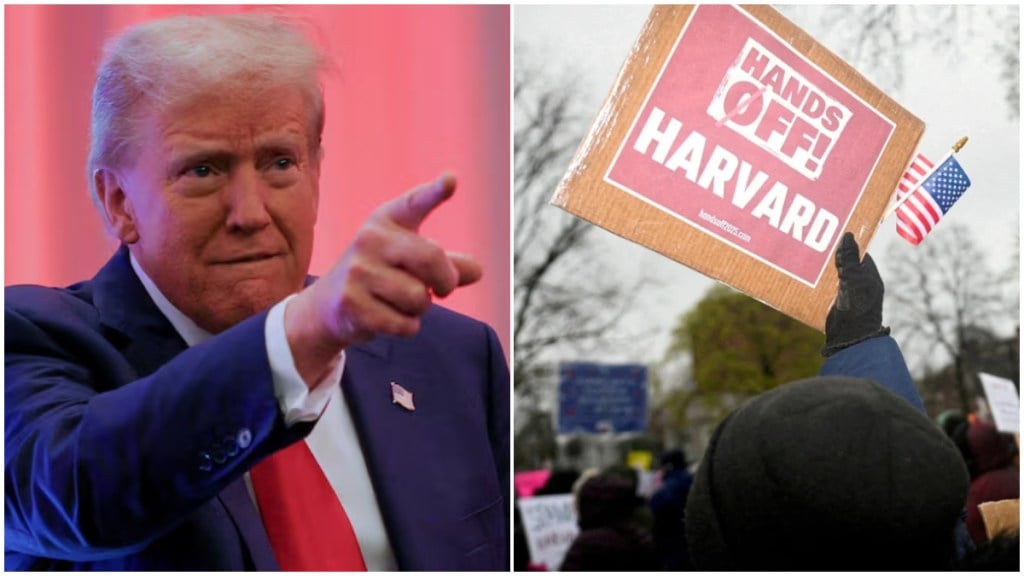Trump vs Harvard: In an escalation of tensions between the White House and the nation’s oldest university, President Donald Trump has signed an executive order revoking Harvard University’s ability to host international students.
The June 4 proclamation prohibits any new international students from entering the United States to attend Harvard and directs the State Department to consider revoking the visas of those currently enrolled.
“The entry of the class of foreign nationals described above is detrimental to the interests of the United States,” Trump stated in the proclamation, accusing the university of fostering discrimination and allowing foreign influence to thrive unchecked.
What did the Trump administration say?
The administration claims the decision is rooted in national security. Homeland Security Secretary Kristi Noem had previously threatened to suspend Harvard’s international programs, citing concerns over foreign interference, radicalism, and antisemitism. Though a federal judge temporarily blocked that move, Trump’s new directive invokes presidential powers under the Immigration and Nationality Act, asserting that Harvard is “an unsuitable destination” for foreign students.
The White House alleges that Harvard has accepted over $150 million in funding from China and failed to report dangerous activity by international students. It also links foreign students to campus unrest following the October 2023 Hamas attacks in Israel.
“The FBI has long warned that foreign adversaries take advantage of access to American higher education,” the order states, referring to longstanding concerns about espionage and propaganda through US universities.
Accusations of discrimination and antisemitism
Beyond national security, the proclamation attacks Harvard for alleged failures to protect Jewish students. Trump accuses the university of tolerating antisemitic protests and failing to take action against agitators—some of whom, the administration claims, were international students.
Additionally, the order revives criticism of Harvard’s use of race in admissions, a practice outlawed by the US Supreme Court in 2023. Trump argues that allowing further international enrollment would “compound” discriminatory practices and reduce opportunities for American students.
“It is not in the interest of the United States to further Harvard’s discrimination… by reducing opportunities for American students through excessive foreign student enrollment,” the order states.
The Harvard visa ban is part of a broader crackdown on elite universities perceived as hostile to the administration’s agenda. Last month, the Department of Homeland Security revoked Harvard’s Student and Exchange Visitor Program certification—a move halted by a federal court. The administration has also directed embassies worldwide to increase scrutiny of applicants seeking Harvard visas, including social media screening.
Trump has criticised top US universities for promoting “anti-American ideology” and announced sweeping reviews of federally funded educational institutions. Harvard alone has lost $450 million in grant funding, with over $2.2 billion in endowment-related federal aid frozen.
The administration is also threatening the university’s tax-exempt status, citing its multi-billion-dollar endowment and alleged lack of cooperation with federal investigations.
Harvard-Trump legal battle
Harvard has denounced the executive order as retaliatory and unconstitutional, arguing that the administration is attempting to coerce academic institutions into political alignment. In a statement, the university said it is expanding its legal challenge against federal efforts to interfere with campus governance and international enrollment.
Legal experts expect the new ban to face swift court challenges, though Trump’s invocation of national interest may complicate legal efforts to overturn it. A previous attempt to restrict international student visas was blocked in 2020, but the current order uses a different legal mechanism.
With international students making up roughly 25 per cent of Harvard’s enrollment, the impact could be profound—not just for the university, but for global education and research collaborations.
As one administration official bluntly put it: “If institutions won’t cooperate, the government will act.”
